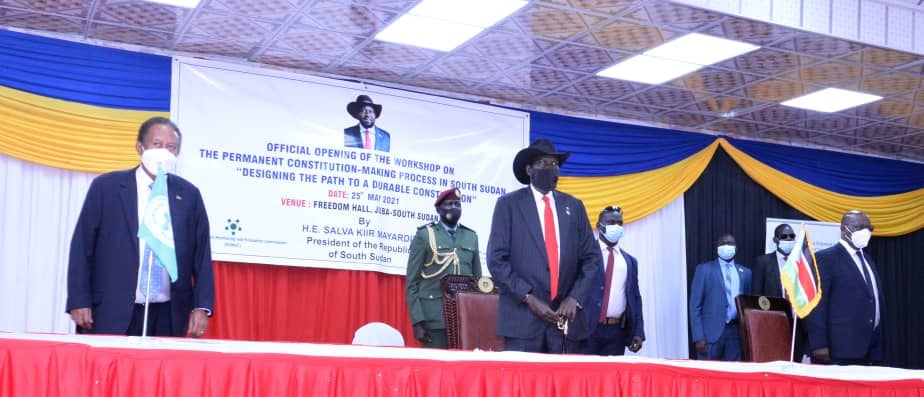Delegates at the workshop on the permanent constitution-making process have called for an inclusive dialogue that shall lead to the formulation of a unifying document.
South Sudan commenced its first milestone in drafting a permanent constitution on Wednesday, May 25, 2021.
According to the revitalized peace agreement, the permanent constitution should be completed within eight months following the commencement of the transitional period.
The transitional period began in February 2019, after several months of delay. However, the process has been delayed for nearly eight months.
The launch of the workshop in Juba signals the beginning of the permanent constitution-making process.
This is as conceived by the revitalized peace agreement which tasks the transitional government to initiate and oversee the country’s permanent constitution-making process.
It was convened by the Reconstituted Joint Monitoring and Evaluation Commission and facilitated by a Germany-based Max Planck Foundation for International Peace and the Rule of Law.
Representatives of the parties to the revitalized peace agreement and stakeholders have gathered at the freedom hall.
Those engaged in the current process are representatives of the former transitional government, the SPLM-IO, Opposition Alliance, Former Detainees, the Other Political Parties, and other stakeholders.
They are expected to reach an agreement on unresolved issues from the 2018 high-level revitalization forum.
They shall also develop resolutions that shall form the basis for drafting the legislation to govern the constitution-making process in South Sudan.
The agreement demands that the process should ensure a peaceful resolution of national issues through dialogue, tolerance, accommodation, and respect for others’ opinions.
On behalf of the SPLM-IO, Oyet Nathaniel said the process should be inclusive of all sectors of the country.
“A constitution is a social contract that citizens must participate in in its negotiation and design and writing,” Nathaniel argued.
“Therefore, we expect the government legislation that shall come out of this workshop to ensure that the process is inclusive and led as well as owned by the people of South Sudan.”
The principles of the constitution-making process require South Sudanese to respect ethnic and regional diversity and communal rights.
The process is also expected by the peace deal to guarantee the right of communities to preserve their history, develop their language, promote their culture, and expression of their identities.
“We the FDs are looking for a constitution which shall not promote tribalism, regionalism, sectionalism and hatred among others,” said Madut Biar, representative of Former Detainees.
The participants of the workshop are expected to identify a body that shall hold the mandate of drafting the constitutional text and its timeframe.
They shall also define the mandate and composition of the reconstituted National Constitutional Review Commission, including the process of nomination.
Albino Akol, the representative of Other Political Parties, or OPP commended the launch of the workshop, saying:
“This workshop marks the beginning of the process of developing a permanent constitution for the people of South Sudan in order for them to move from transitional periods to a permanent one, where the basis of founding, united and sovereign nation is enshrined.”
According to the program document seen by Eye Radio, the parties participating in the workshop in Juba shall decide how the public shall participate in the constitution-making process.
They shall decide on the steps to be taken to ensure effective public participation at all agreed stages.
The 2018 revitalized peace agreement says the current process shall be based on the principles of supremacy of the people of South Sudan, initiate a federal and democratic system of government that reflects the character of South Sudan.
Other principles are guaranteeing good governance, constitutionalism, rule of law, human rights, gender equity, and affirmative action.
Clement Juma, a representative of the South Sudan Opposition Alliance, or SSOA, encouraged the participants to be open-minded.
“Let’s avoid being misunderstood, no particular political or group shall have domination or membership,” he appealed.
The outcome of the current workshop shall lead to the enactment of legislation that shall govern the constitution-making process.
It shall also lead to the transformation of the transitional national legislative assembly into a constituent assembly to facilitate the adoption of the permanent constitution.
Dengtiel Ayuen, who initiated the bills and witnessed the legislation of several issues at the national parliament in Juba, said the constitution “is not theirs but for the people of South Sudan”.
“It is the hope and wish of everyone, the people of South Sudan, and they are looking forward to a successful constitution-making,” Hon. Dengtiel added.
South Sudan is currently governed by the 2011 transitional constitution which was amended to incorporate the 2018 revitalized peace agreement.
The three-day permanent constitution-making process is expected to conclude on Friday.
It was launched by President Salva Kiir, Sudanese Prime Minister, and IGAD chairperson, Abdalla Hamdok.
During his opening remarks on Wednesday, President Salva Kiir called on the parties to put the aspirations of the ordinary people above the interests of their political parties.
He said: “We want this to be a people-driven process, we cannot afford to get it wrong.”
The organizers say the negotiated outcome of the workshop shall be outlined in a resolution document which shall then be submitted to the Ministry of Justice and Constitutional Affairs.
The permanent constitution shall then lead to the conduct of general elections in South Sudan where those elected shall receive their new mandate.

